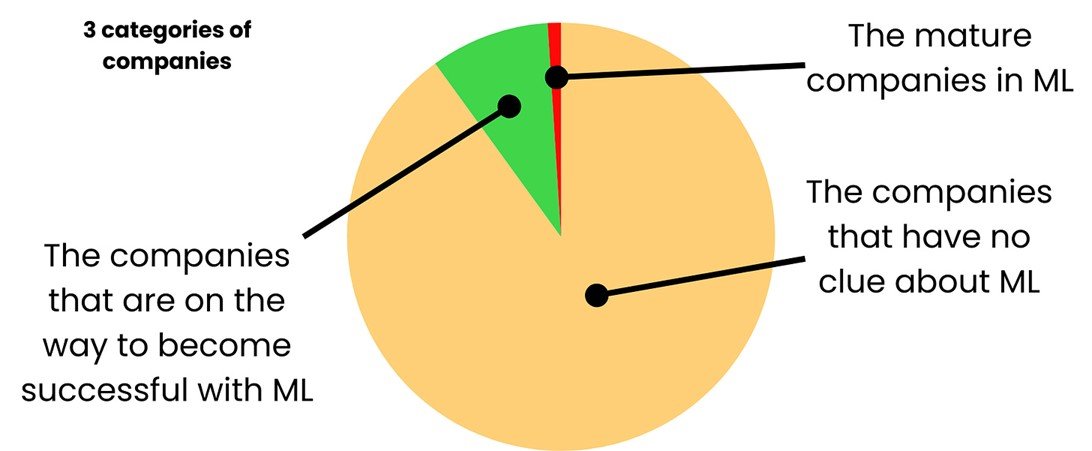
What are the best companies to apply your Machine Learning skills? There are many aspects to consider, but I believe one very important one is the maturity of the ML effort.
Register Your Details
I see 3 clear classes of companies out there:
Those that have no clue about ML
This is most of the corporate world! ML has definitively no impact on revenue, and the leaders have no idea how to extract value from ML. They don’t have the right data, they don’t have the right applications, they don’t have the right data infrastructure, they don’t have the right people. Those companies might be a sweet spot for consultants or maybe people with an entrepreneurial mindset. A newcomer in such an organization will need to wear many engineering hats, be an AI advocate, be an AI salesperson, argue for the right budget allocation, and lead projects without much belief from his/her peers… It can be fun, but it will be exhausting, and the most simple trivial steps will be a challenge, especially in a big company where the inertia is high! If you are not an entrepreneur, you will be bound to work on low-impact and low-scale projects that will not help you to grow much as an ML expert.
The companies that are on the way to becoming successful with ML :
I think we are seeing more and more of those types of companies nowadays. The leaders understood the value of ML, and a good budget is allocated to the effort. Usually, a sizable piece of current or future revenue is bet on ML. A clear proxy to recognize those companies is how much they are investing in MLOPs. They are thinking about feature stores, ML monitoring, the tight coupling between the serving pipeline and the training pipeline, the data needed for continuous updates of the models, or future ML development endeavors. I think those companies are a sweet spot for generalists. The systems are immature enough that you will need to wear multiple hats. You will be able to think about new ML products alongside the ML system design, data engineering pipelines, or the right ML algorithms. You probably won’t have time to think too much about the latest algorithm as there might be lower-hanging fruits to grab first.
The Mature companies in ML
Those are basically the FAANGs and similar big tech companies. ML is an integral part of the revenue, and the MLOPs are bleeding edge. Think about Google, it is the biggest adtech (== ML) company in the world! Those companies might be a sweet spot for the specialists. In those companies, you will focus on very specialized problems with very specialized tools. You will not be able to think about data engineering alongside ML development. You will be able to implement the latest algorithms at scale and work closely with R&D departments. The infrastructures, the teams, or the scales of the data in general are huge in those companies, and there is a real inertia in doing anything. It is harder to move fast like in a startup.

Should you work in a startup or in a big tech company? I think there are a couple of clues
and red flags to look out for!
A small startup (1-50 people) that doesn’t have a business model directly tight to ML is unlikely to be able to make good use of ML. It is too small to really invest correctly in the underlying tools or data. They need to focus on 1 or 2 products, and their time and money cannot be cannibalized by an ML effort. They may think they need ML but most of the time, the leaders don’t have the expertise to really make an educated decision on the subject. In the end, they might need 0 or 1 model being deployed, but then, the ML people end up doing some non-ML analytical work, or they get fired. The ML/revenue coupling is a strong indicator of a healthy ML practice. If ML is not coupled to the revenue, during any financial hardship, the ML people will be the first ones to be laid off.
In general the company size can be quite correlated with the ML maturity. A low ML maturity will give you the opportunity to wear many hats: you will need to be the ML expert as well as the data analyst, the data engineer, a back engineer, the product manager, the AI advocate, … To me, that the best way to learn to see the big picture but it is also a risk to work in a badly thought through structure if the right people are not hired..
A startup is great for people with a scrappy entrepreneur mindset who want to build things from 0 to 1 and want to understand how ML relates to the business. A big tech company (and ML mature) might be a great place for people who want to dig deep into the details of a specific application but don’t care as well much about the big picture. An important point, it is also MUCH easier to get a sense of impact when you work in a startup compared to a big company, especially if you are directly impacting the revenue. In a startup, your skills are more likely to be unique compared to your colleagues as the teams are much smaller. Unfortunately, in a big tech company, it is easy to start feeling unimportant when you work on very small items, and you are surrounded by so many smart people with the same skills as yours.
